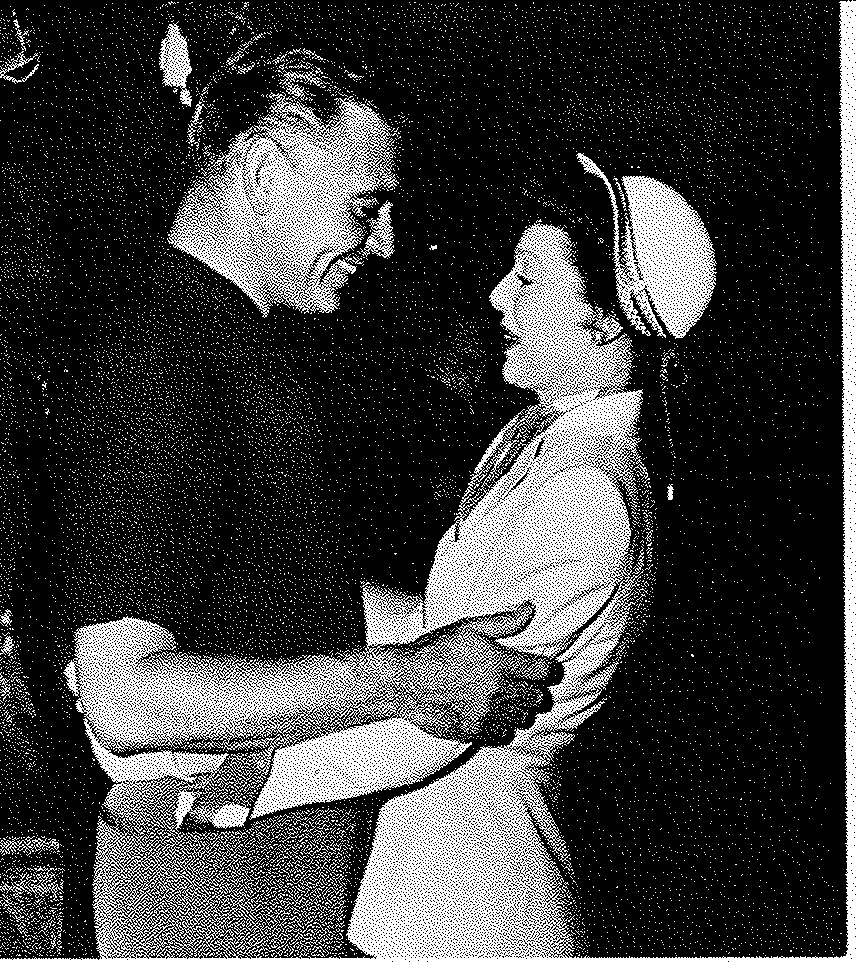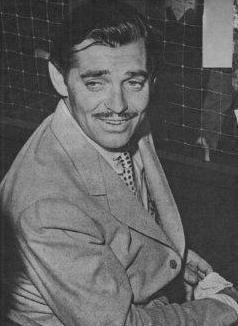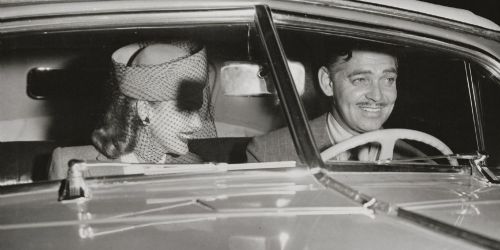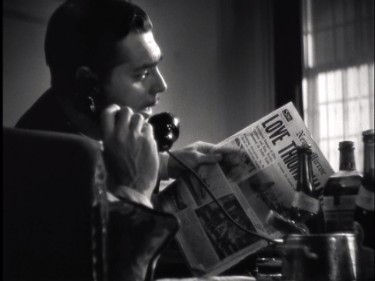{New Article} 1950: Meet a Great Lady

Sometimes work duties can be awkward. Like, say, when you are required to pen an essay detailing why your co-star is so great, and you and said co-star had a secret baby out of wedlock fifteen years earlier. Yeah. That’s awkward.
During the press circuit of To Please a Lady, Clark Gable and Loretta Young were asked to do just that. The whole story of their secret baby was known widely around Hollywood but not so much in the households of moviegoers. I’ve often wondered why the producers even proposed starring them together, if it was such a widely known fact. It doesn’t surprise me one iota that neither Clark nor Loretta hesitated to be reteamed on the screen; they were professionals and probably thought that them starring together would put to bed the old rumors.
Of course these articles are fluffy, fluffy fluff and of course the whole time you are reading them, you can’t help but smirk at what they are leaving out. But I do believe that ultimately Clark and Loretta did have respect for each other and did actually LIKE each other. In my opinion, as we can only speculate at this point, I have always believed that what went on between Clark and Loretta was a in-the-heat-of-the-moment thing, a fling so to speak. And once filming was complete and the company headed back to Los Angeles, I don’t believe that either one of them thought they’d make a go of a relationship. It just what what it was. I have no doubt in my mind that if Clark had been a single man when Loretta revealed her pregnancy that he would have married her. He would have done the right thing, certainly. But he couldn’t. So the both of them did what they had to do. She bore the child and pretended to adopt it later, he carried on with his life.
So, fifteen years later, here’s what Clark had to say about Loretta:
Before setting down a few observations on Loretta Young, I decided to check up on a few newspapers and magazines in which interviews were published, just to see how a guy goes about this sort of thing.
When I finished this research I was in more trouble than I had been when I started. Maybe that’s always one trouble with putting yourself wise—the more you learn, the less you know.
I found out that if you’re going to write a story about anyone, you should discover a few startling facts about your subject: like she had hunted tigers in Africa, or she paints portraits of Amazon savages, or she buys all of her clothing to match her mauve (whatever color that is) station wagon.
Well, Loretta simply doesn’t provide any startling facts. She is the nicest, sweetest, sincerest, most normal girl you would want to meet. If she were a man, her friends would say of her that she is a swell Joe.
I met Loretta about twelve years ago, when we were what is laughingly called “co-starred” in the same picture. The only star in that picture was the weather. We arrived in Bellingham, Washington, one afternoon in the midst of a blizzard which kept right on blizzarding for nine days. We were quartered, about thirty of us, in an airy building intended for use during the July heat wave. Brrrother was it cold!
We spent most of our time huddled around a stove, glaring at one another. After the first three days everyone had “cabin fever,” which is a polite term for the urge to kill. All except Loretta. My chief recollection of her at that time consists of seeing her standing at the window, nose pressed against a frosted pane, watching for Arvid Griffin to show up with the mail.
Arvid Griffin was, in those days, a Bellingham school boy who breezed in through the flakes and offered to be our emissary on snowshoes. All he could talk about was Hollywood. Most of us nodded and said, “Yeah, yeah,” from the depths of a book when he plied us with questions, but Loretta was genuinely friendly and interested.
She kept saying, “If you really want to get to Hollywood, you’ll get there. If the desire is planted deeply, and you won’t be distracted from your aim, you’ll succeed.”
There was something about the sincerity of her tone that would have convinced a totem pole.
So here’s an item: Arvid Griffin, once of Bellingham, Washington, was the second assistant director on “Key To The City,” the picture I just finished with Loretta. He regards her as a prophet—almost as a saint.
During the twelve years between “Call Of The Wild” and “Key To The City,” I didn’t see much of Loretta. I remembered her as a sweet kid, sort of carefree and good-natured, not too much interested in her career in spite of having plenty of talent.
I found out, during the first few days of the picture, that the carefree kid had matured into a great lady and a real trouper.
Clark’s voice is definitely in the writing. He’s probably right about research on Loretta not turning up much! “Didn’t see much of Loretta”—um, no you didn’t!
She’s a gorgeous soul. Instead of returning to her dressing room between scenes, she would join Ruth Roberts (the dialogue coach) and either go over lines, or chat. In the midst of the hustle and bustle of the sound stage, with electricians moving huge light standards, grips moving walls, prop men bringing up fresh items of equipment, and foreman yelling directions, Loretta would be perched on a tall, wooden stool, watching the activity with as much real enjoyment as if it had been all new to her.
She has the happy quality of never being bored. Everything interests her and everyone interests her. She knows which gaffer is about to become a father, and whether he and his wife want a boy or a girl and what they plan to name the child; she knows whose mother is ill, and who is taking a vacation trip to Honolulu. What a memory! And what genuine interest in her fellow human beings!
Another Young attribute which appeals to a man is that Loretta is devoted to her husband and her youngsters. She is that rare combination, a natural-born homemaker as well as a very successful actress.
Natural-born homemaker! I think nowadays that would be considered an insult! No, you are not going to find any nitty gritty here.
You can read the article in its entirety in the Article Archive and stay tuned for Thursday, when I have Loretta’s essay on Clark.



One Comment
Barry Lane
Nice piece. The Arvid Griffin thing really does the trick. Now, about Clark and David Janssen…